
Voters wait in line to cast their ballots in the primary election at the Paradise Recreation Center Tuesday, June 9, 2020.
Thursday, June 11, 2020 | 2 a.m.
No one can know where Las Vegas will stand in its recovery from the coronavirus pandemic when November rolls around.
But Tuesday’s primary election offered a sneak preview of how Election Day could play out here in terms of turnout. It could be one for the ages, which vindicated the voting-rights advocates who had fought to make balloting as convenient as possible under the unprecedented circumstances.
Tuesday was a slog for voters, who waited hours to cast their ballots during a perfect storm brought on by a crush of turnout and a process that was anything but ordinary due to pandemic-related complications. Only three polling places were opened, and paper balloting replaced the usual electronic filing. Volunteers sanitized stations for voting and registration after each person, which contributed to the waits.
Nevada Democrats said in a statement that the outcome — people waiting up to six hours and the last vote coming after 3 a.m. — “are the exact problems we worked to avoid.”
“These problems were entirely avoidable by the secretary of state,” the statement read. “They are the consequences of inadequate polling locations across the state. If not for the intervention of (Nevada Democrats) and our partner groups to increase the number of in-person locations beyond just one in Clark County — which was the minimum required by the secretary of state — these problems undoubtedly would have been exacerbated.”
Related content
After Nevada Secretary of State Barbara Cegavske ordered the primary to be conducted by mail ballot, the Democrats and several partner groups filed suit seeking, among other things, for ballots to be mailed to all registered voters as opposed only to active voters, expanding the number of polling locations and allowing greater voter assistance so that community groups could collect ballots.
Based on the lawsuit, the number of Clark County polling locations was expanded from one to three, and voting officials made other concessions, such as deputizing volunteers to serve as field registrars of voters.
Democrats said they would “continue to fight for these changes in the general election should we be under the same circumstances in November.”
Meanwhile, groups on the right attempted to block the vote-by-mail method, claiming in an initial lawsuit that officials hadn’t taken adequate safeguards against fraud and then later revising their suit to claim mail-in balloting was “unnecessary to combat COVID-19.”
Those claims, described by progressives as attempts at voter suppression, went nowhere in court. U.S. District Judge Miranda Du shot down both versions, remarking pointedly the second time around that the amended complaint “glaringly repackages old arguments.”
Tuesday’s voting, which featured voters who had yet to register or who either couldn’t mail their ballot or preferred not to, played out like a tour bus swamping a restaurant at lunch hour. For a primary election, where turnout tends to run cold, the lines were jarring to see.
Yet voters persevered, indicating that engagement in the November election could be intense amid passions on both sides over President Donald Trump and the wave of Black Lives Matter activism stemming from the death of George Floyd.
As local voter Nancy Castro told Las Vegas Sun reporter John Sadler as she waited to cast her ballot at the Paradise Recreation Center, “Things have changed, and I’m not sure I want to back somebody who every single police organization is behind.”
Clark County received 225,547 mail-in ballots, which already eclipsed the 199,994 total ballots cast in the 2018 primary and the 143,818 cast in the 2016 primary.
Las Vegas residents who have lived here for years may have heard the narrative that people here don’t care much about politics, but there’s every reason to believe that’s not the case now.
Meanwhile, steps have been taken in recent years to make it easier for voters to participate. Among them was the Clark County Election Department swapping out the old precinct voting approach in favor of voting centers that allow local residents to cast their ballots at any of hundreds of locations across Southern Nevada. Expanded early voting in 2018 led to a record number of Clark County residents casting their ballot before Election Day.
In addition, Nevada voters in 2018 approved the “motor voter” ballot question allowing for automatic voter registration when applying for a driver’s license or state-issued ID card. Another step forward came in the 2019 legislative session, when lawmakers approved a measure consolidating odd-year municipal elections with even-year balloting for president, Congress and state offices. Turnout in those odd-year elections is typically abysmal, as shown in 2019 when only 12.5% of voters cast ballots in municipal races in Las Vegas, North Las Vegas and Boulder City.
The upshot is that if voting is convenient, voters will come. And if Tuesday is any indication, they’re coming in big numbers in November regardless of where things stand with the pandemic.
When Nevada Democrats and voting-rights advocates contend that the kind of steps they fought for in the primary will head off the problems of Tuesday, they make a strong argument.

